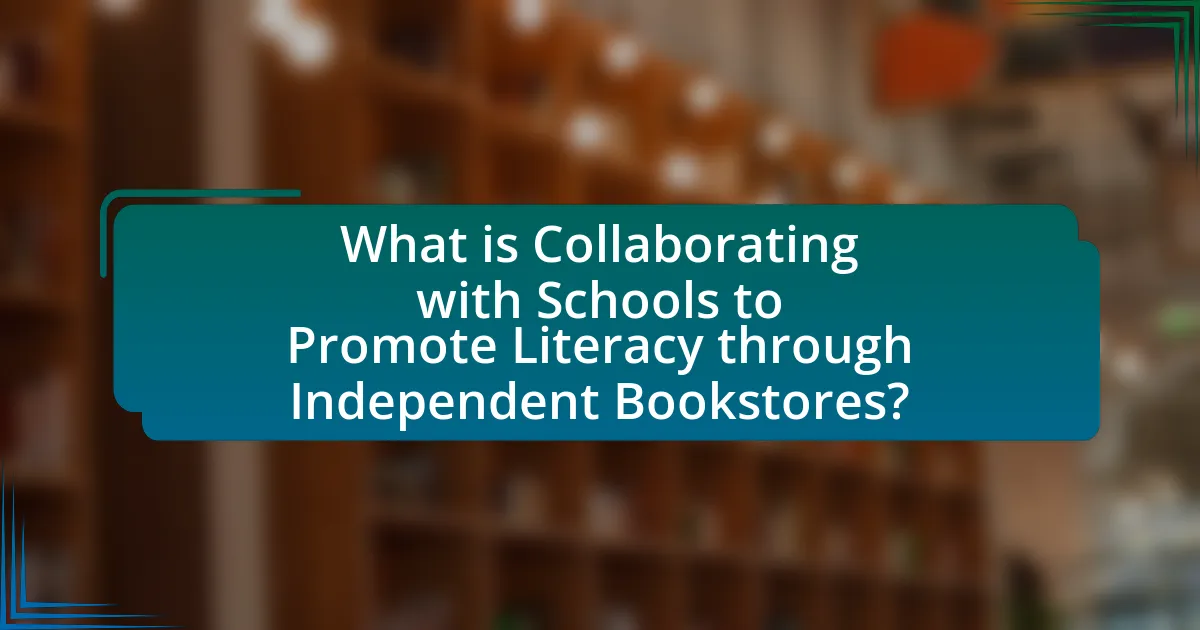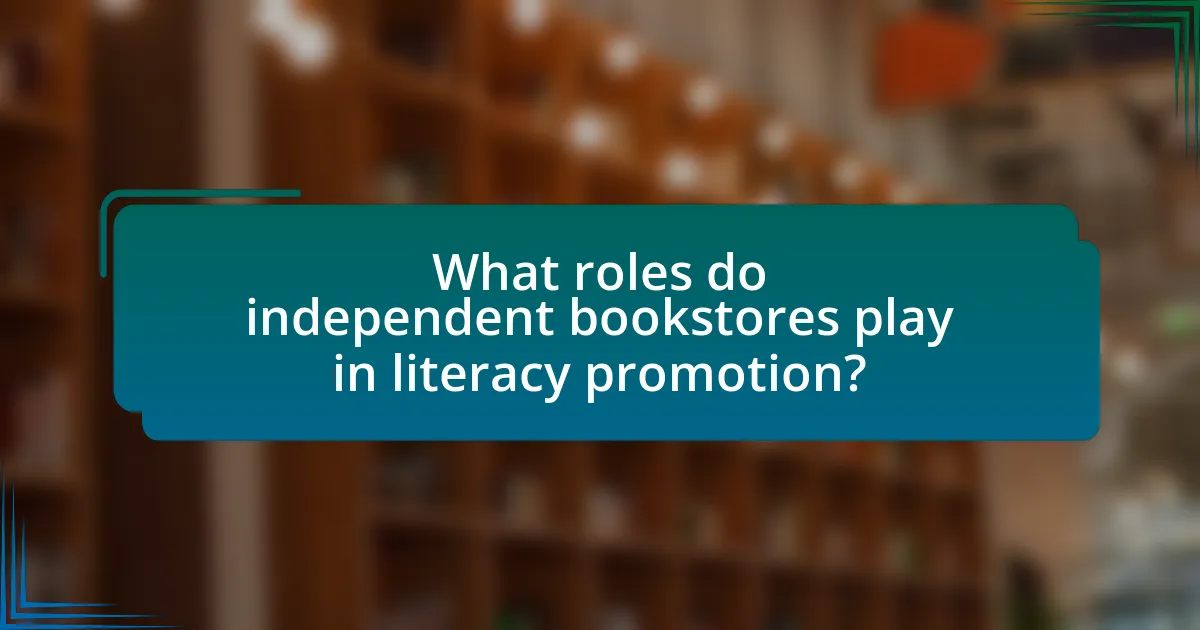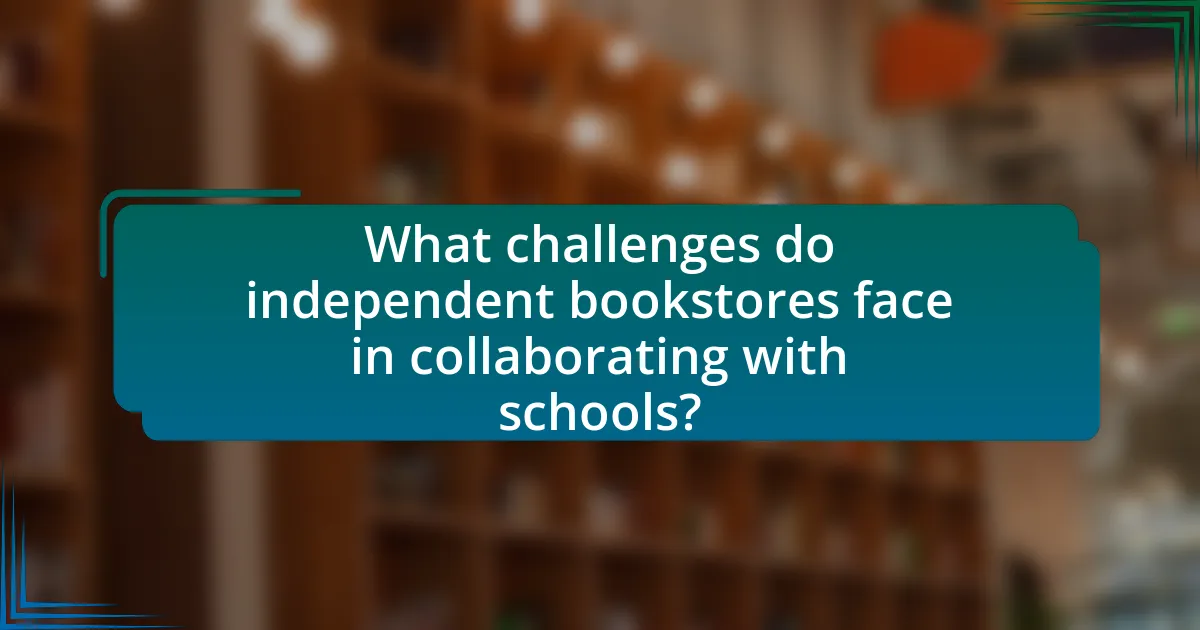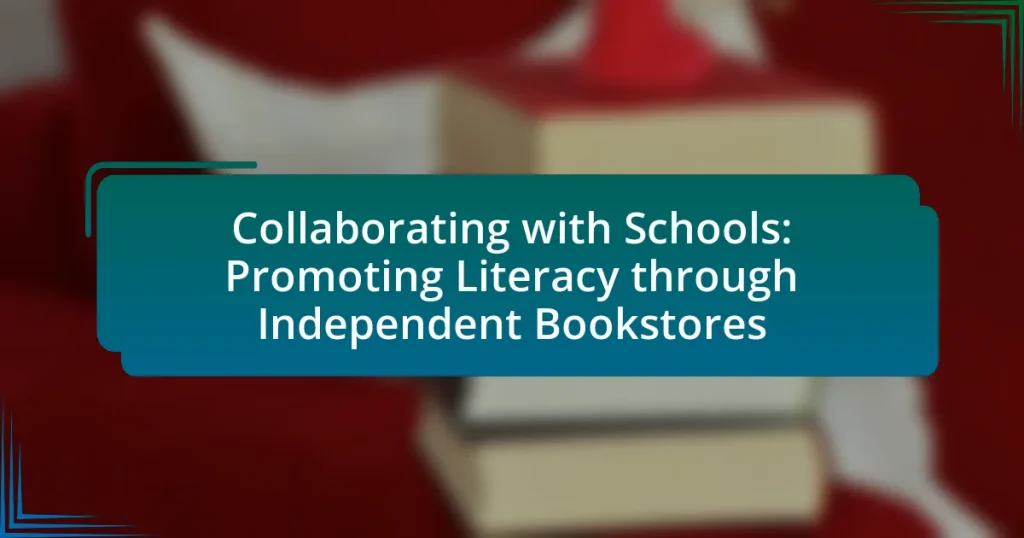Collaborating with schools to promote literacy through independent bookstores involves partnerships aimed at enhancing students’ reading skills. These collaborations include organizing book fairs, author events, and literacy programs that provide access to diverse reading materials and foster a love for literature. Research indicates that such initiatives can significantly improve literacy rates among students, as they engage with various genres and authors. Independent bookstores play a vital role by offering tailored programs, workshops, and resources that align with educational standards, ultimately contributing to students’ academic success and lifelong learning.

What is Collaborating with Schools to Promote Literacy through Independent Bookstores?
Collaborating with schools to promote literacy through independent bookstores involves partnerships where bookstores work with educational institutions to enhance reading skills among students. This collaboration often includes organizing book fairs, author events, and reading programs that encourage students to engage with literature. Research indicates that such partnerships can significantly improve literacy rates; for instance, a study by the National Endowment for the Arts found that children who are exposed to books and reading activities are more likely to develop strong literacy skills. By leveraging the resources and expertise of independent bookstores, schools can create a supportive environment that fosters a love for reading and learning.
How do independent bookstores collaborate with schools?
Independent bookstores collaborate with schools by organizing events such as author readings, book fairs, and literacy programs that promote reading among students. These collaborations often include providing discounted books for school curricula, facilitating book donation drives, and hosting workshops for teachers on integrating literature into their classrooms. For instance, many independent bookstores partner with local schools to create reading lists that align with educational standards, ensuring that students have access to relevant and engaging literature. This partnership not only supports literacy development but also fosters a sense of community and encourages students to develop a lifelong love for reading.
What types of programs do independent bookstores offer to schools?
Independent bookstores offer various programs to schools, including author visits, book fairs, reading challenges, and literacy workshops. Author visits provide students with direct interaction with writers, fostering a love for reading and writing. Book fairs allow schools to raise funds while promoting book sales, often featuring curated selections that align with educational goals. Reading challenges encourage students to read more by setting goals and rewarding achievements, which can enhance engagement and literacy skills. Literacy workshops focus on teaching reading strategies and critical thinking, often tailored to specific age groups or reading levels, thereby supporting the overall literacy development of students.
How do these collaborations enhance literacy among students?
Collaborations between independent bookstores and schools enhance literacy among students by providing access to diverse reading materials and fostering a love for reading. These partnerships often include book fairs, author visits, and reading programs that engage students and encourage them to explore various genres. Research indicates that students who participate in such collaborative initiatives show improved reading comprehension and increased motivation to read, as evidenced by a study conducted by the National Literacy Trust, which found that children who engage with books outside of school settings demonstrate higher literacy skills.
Why is promoting literacy important in today’s educational landscape?
Promoting literacy is crucial in today’s educational landscape because it directly impacts students’ academic success and lifelong learning. Literacy skills enable students to comprehend complex texts, engage critically with information, and communicate effectively. According to the National Assessment of Educational Progress, students who are proficient in reading are more likely to perform well in other subjects, highlighting the interconnectedness of literacy and overall academic achievement. Furthermore, promoting literacy fosters a culture of reading, which has been shown to improve cognitive development and social skills, essential for personal and professional success in an increasingly information-driven society.
What are the current literacy rates among students?
As of 2023, the global literacy rate among students is approximately 86%, according to UNESCO. This figure reflects the percentage of individuals aged 15 and older who can read and write in their native language. The literacy rates vary significantly by region, with developed countries generally reporting higher rates compared to developing nations, where challenges such as access to education and resources persist. For instance, in sub-Saharan Africa, the literacy rate is around 65%, highlighting the disparities in educational attainment across different areas.
How does literacy impact a child’s overall academic success?
Literacy significantly impacts a child’s overall academic success by enhancing their ability to comprehend and engage with educational materials. Children who are proficient in reading and writing are better equipped to understand complex concepts across subjects, leading to improved performance in assessments and classroom participation. Research indicates that students with strong literacy skills are more likely to achieve higher grades and demonstrate greater critical thinking abilities. For instance, a study published in the “Journal of Educational Psychology” found that early literacy development correlates with later academic achievement, emphasizing the importance of reading proficiency in foundational learning.

What roles do independent bookstores play in literacy promotion?
Independent bookstores play a crucial role in literacy promotion by providing access to diverse reading materials and fostering a love for reading within communities. These bookstores often host events such as author readings, book clubs, and literacy workshops that engage readers of all ages, encouraging them to explore literature. Research indicates that communities with independent bookstores report higher literacy rates, as these establishments create an inviting atmosphere that supports reading as a social activity. Furthermore, independent bookstores frequently collaborate with local schools to provide resources, organize book fairs, and offer tailored reading programs, thereby directly contributing to the literacy development of students.
How do independent bookstores select books for school programs?
Independent bookstores select books for school programs by assessing educational needs, aligning with curriculum standards, and considering student interests. They often collaborate with educators to understand specific requirements and preferences, ensuring that the selected titles are age-appropriate and relevant to the subjects being taught. Additionally, independent bookstores may utilize feedback from students and teachers to refine their selections, focusing on diverse genres and inclusive narratives that promote literacy and engagement. This approach not only supports educational goals but also fosters a love for reading among students.
What criteria do bookstores use to choose age-appropriate literature?
Bookstores use several criteria to choose age-appropriate literature, including content suitability, reading level, and thematic relevance. Content suitability ensures that the themes and language are appropriate for the target age group, while reading level assesses the complexity of vocabulary and sentence structure. Thematic relevance involves selecting books that resonate with the interests and experiences of children at different developmental stages. Research indicates that age-appropriate literature enhances literacy development by engaging young readers and fostering a love for reading, as supported by studies from the International Literacy Association.
How do bookstores ensure diversity in their book selections?
Bookstores ensure diversity in their book selections by actively curating titles from a wide range of authors, genres, and cultural backgrounds. They often collaborate with diverse communities and organizations to identify underrepresented voices and themes, ensuring that their inventory reflects a broad spectrum of experiences. For instance, many independent bookstores participate in initiatives like the “We Need Diverse Books” campaign, which promotes literature that reflects the diversity of the world. Additionally, bookstores may host events, book clubs, and author signings that focus on diverse authors, further enriching their selections and fostering an inclusive reading environment.
What events do independent bookstores host to support literacy?
Independent bookstores host various events to support literacy, including author readings, book clubs, writing workshops, and children’s storytime sessions. These events engage the community, promote reading habits, and provide a platform for local authors and educators to share their work. For instance, author readings often feature discussions about the importance of literacy and can inspire attendees to read more. Writing workshops encourage participants to develop their writing skills, fostering a love for literature. Additionally, children’s storytime sessions introduce young readers to books, enhancing their literacy skills from an early age. Such initiatives not only promote literacy but also strengthen community ties and support local culture.
How do author readings and book signings contribute to literacy promotion?
Author readings and book signings significantly contribute to literacy promotion by engaging communities and fostering a love for reading. These events provide direct interaction between authors and readers, which can inspire attendees to explore literature further. Research indicates that author visits can lead to increased book sales and library checkouts, as seen in studies conducted by the National Endowment for the Arts, which found that exposure to authors can enhance reading motivation among children and adults alike. Furthermore, these events often include discussions about the writing process and storytelling, which can improve comprehension and critical thinking skills, thereby reinforcing the importance of literacy in everyday life.
What workshops or educational programs are offered for students?
Independent bookstores offer various workshops and educational programs for students, focusing on enhancing literacy and fostering a love for reading. These programs often include author readings, writing workshops, and book clubs tailored for different age groups. For instance, many bookstores collaborate with local schools to host events that encourage creative writing and critical thinking, providing students with hands-on experiences that complement their classroom learning. Additionally, statistics show that participation in such programs can significantly improve students’ reading comprehension and engagement, making them a valuable resource in promoting literacy.

What challenges do independent bookstores face in collaborating with schools?
Independent bookstores face several challenges in collaborating with schools, primarily including limited budgets, competition from larger retailers, and logistical issues. Schools often operate under tight financial constraints, making it difficult for them to allocate funds for partnerships with independent bookstores. Additionally, larger retailers frequently offer lower prices and more extensive inventory, which can deter schools from choosing local bookstores. Logistical challenges, such as coordinating events, managing inventory, and aligning schedules, further complicate these collaborations. These factors collectively hinder the ability of independent bookstores to effectively partner with educational institutions.
How do funding and resources affect these collaborations?
Funding and resources significantly influence collaborations between independent bookstores and schools by determining the scope and effectiveness of literacy programs. Adequate funding allows bookstores to provide essential materials, host events, and offer incentives for student participation, thereby enhancing engagement and learning outcomes. For instance, a study by the National Endowment for the Arts found that increased funding for literacy initiatives leads to higher student reading proficiency levels. Additionally, resources such as trained staff and access to diverse book selections enable bookstores to tailor their offerings to meet the specific needs of schools, fostering a more impactful partnership.
What strategies can bookstores use to overcome financial barriers?
Bookstores can overcome financial barriers by implementing community engagement strategies, such as hosting events and forming partnerships with local schools. These strategies not only increase foot traffic but also foster a sense of community, which can lead to increased sales. For instance, bookstores that collaborate with schools to organize reading programs or book fairs can tap into a steady customer base of students and parents, enhancing their visibility and revenue. Research indicates that independent bookstores that actively engage with their local communities see a 20% increase in sales compared to those that do not participate in community events.
How can partnerships with local businesses enhance support for literacy initiatives?
Partnerships with local businesses can enhance support for literacy initiatives by providing resources, funding, and community engagement. Local businesses often have a vested interest in the educational outcomes of their communities, which can lead to financial contributions or in-kind donations such as books and educational materials. For example, a study by the National Endowment for the Arts found that community involvement in literacy programs significantly increases participation and effectiveness. Additionally, local businesses can host events, such as book fairs or reading programs, that promote literacy while fostering a sense of community. This collaboration not only supports literacy initiatives but also strengthens the relationship between businesses and the community, creating a sustainable model for ongoing support.
What are the common misconceptions about independent bookstores and schools?
Common misconceptions about independent bookstores and schools include the belief that independent bookstores primarily serve niche markets and lack educational resources, and that schools do not benefit from partnerships with these bookstores. In reality, independent bookstores often provide a diverse range of literature that supports various educational curricula and promote literacy initiatives tailored to local communities. For instance, many independent bookstores host author events, reading programs, and workshops that directly engage students and educators, fostering a collaborative environment that enhances learning experiences. Additionally, studies show that partnerships between schools and independent bookstores can lead to improved student literacy rates, demonstrating the significant role these bookstores play in educational development.
How can these misconceptions be addressed to foster better collaboration?
Misconceptions can be addressed to foster better collaboration by implementing targeted educational initiatives that clarify the roles and benefits of independent bookstores in promoting literacy. For instance, workshops and informational sessions can be organized for educators and parents, highlighting successful case studies where independent bookstores have effectively partnered with schools to enhance literacy programs. Research indicates that such collaborations can lead to increased student engagement and improved reading outcomes, as evidenced by the National Literacy Trust’s findings that community involvement significantly boosts literacy rates. By actively dispelling myths and showcasing tangible benefits, stakeholders can create a more supportive environment for collaboration between schools and independent bookstores.
What evidence supports the effectiveness of these collaborations?
Collaborations between independent bookstores and schools effectively promote literacy, as evidenced by various studies demonstrating improved reading outcomes. For instance, a study conducted by the National Literacy Trust found that children who participated in community reading initiatives, including those involving local bookstores, showed a 20% increase in reading enjoyment and a 15% improvement in reading skills over a year. Additionally, partnerships that provide access to diverse reading materials have been linked to higher literacy rates, as reported in the Journal of Educational Research, which highlighted that students exposed to a wider range of books through these collaborations scored significantly higher on standardized reading assessments. These findings underscore the positive impact of bookstore-school collaborations on literacy development.
What best practices can independent bookstores adopt for successful school collaborations?
Independent bookstores can adopt several best practices for successful school collaborations, including establishing strong relationships with educators, offering tailored book selections, and hosting engaging events. Building relationships with teachers and school administrators fosters trust and understanding of their needs, which can lead to more effective partnerships. Providing curated book lists that align with school curricula ensures that the selections are relevant and beneficial for students. Additionally, organizing events such as author readings, book fairs, and literacy workshops can create a vibrant community atmosphere that promotes reading and literacy. These practices are supported by studies showing that community engagement and tailored programming significantly enhance student literacy outcomes.
How can bookstores effectively communicate with educators and school administrators?
Bookstores can effectively communicate with educators and school administrators by establishing direct relationships through regular outreach and tailored communication strategies. This includes organizing events such as book fairs, author readings, and educational workshops that cater specifically to the needs of schools, thereby fostering a collaborative environment. Additionally, bookstores can utilize newsletters and social media platforms to share relevant resources, new book releases, and educational programs that align with curriculum standards. Research indicates that partnerships between bookstores and schools enhance literacy rates, as seen in initiatives like the “Books for Schools” program, which has successfully increased access to diverse reading materials in educational settings.
What role does community involvement play in successful literacy programs?
Community involvement is crucial for the success of literacy programs as it fosters collaboration, resource sharing, and local engagement. When community members participate, they contribute diverse perspectives and resources that enhance program effectiveness. For instance, research indicates that programs with strong community ties, such as those involving local bookstores, see increased participation rates and improved literacy outcomes. A study by the National Center for Education Statistics found that community-supported literacy initiatives can lead to a 20% increase in reading proficiency among participants. This demonstrates that active community involvement not only enriches literacy programs but also directly correlates with measurable improvements in literacy skills.


